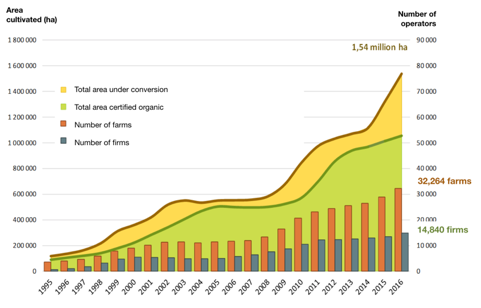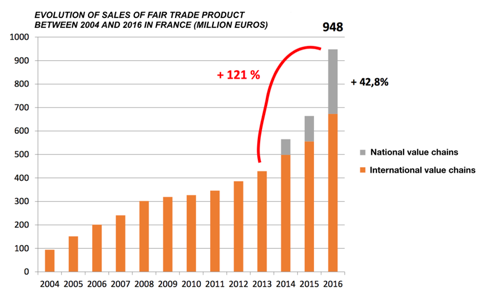News
13 July 2017
Our food system: some reasons for hope…
Readers of hungerexplained.org have sometimes the impression that articles presented on this website are more critical and pessimistic than laudatory or optimistic. It is somewhat true, but unfortunately, this attitude is justified as facts do generally not depict a positive evolution of the world food system. This notwithstanding, let’s not forget our moto that says, quoting Antonio Gramsci, that although we are pessimists because of intelligence, we are also optimists by will.

Today, we are happy to present some signs of positive changes illustrated by data on organic products and fair trade that contribute to the improvement of our food system.
Regarding organic products
At global level: a very rapid growth
According to the latest statistics on organic products in the world, published by IFOAM and FiBL, area cultivated under organic agriculture have seen a four-fold increase in 15 years to reach 44 million hectares in 172 countries during 2014 (equivalent to 1.5 times total agricultural area of France). There were, in the same year, 2.3 million organic producers in the world (eleven times more than in 1999), most of whom live in Asia, and the global ‘organic’ turnover had reached $80 billion (six times the turnover in 1999).
Oceania ranked first with 40% of the world area under organic agriculture, followed by Europe (27%) and Latin America (15%). In 2014, the three largest organic goods consumers were the US, Germany and France.
Despite the remarkable growth achieved by organic agriculture, it is regretted that, unfortunately, research efforts in this domain are very much insufficient compared to needs.
In France : a boom, since 2014
Growth of organic products at world level is reflected in France.
According to the Barometer of the l’Agence française pour le développement et la promotion de l’agriculture biologique, in charge of the development and promotion of organic agriculture in the country, the consumption of organic products increased by more than 20% in 2016 (+33% for fruits and vegetables) to reach more than 7 billion euros’ value. The report of the agency adds that “almost 9 out of 10 French people (89%) consumed organic products in 2016, close to 7 out of 10 (69%) declared consuming them regularly, i,e. at least once a month, and 15% every day!”. These results should be compared to those found in 2003, when almost half of the French people declared they never consumed organic products. This clearly illustrates a growing awareness that has started to change profoundly the way the French eat.
It is important to note here that, contrarily to what is often thought, the French are not just concerned, when eating, with the effect their food has on their health. They also give a growing importance to the protection of the environment. While in 2007, two-thirds of the French thought that protection of the environment was important, they were 92% in 2016 of this opinion and “they find in organic food a response to what they expect from the agriculture of the future, based on a respect of the environment, animal welfare and that promotes employment and territorial development’.
Most of the organic products are bought in medium and large scale supermarkets (45%), followed by specialised shops (37%), while direct sales from producers only represent 13%. This suggest that moving to consumption of organic products does not necessarily imply a change of source of supply. These data also demonstrate that supermarkets have actively invested the organic products market.
The growing interest in organic food also has considerable effects:
-
•A growth of employment in the sector of 8,4% over four years;
-
•A growth of the share of total cultivated area allocated to organic farming that is now above 5% (17% for orchards and 9% for vineyards);
-
•An increase of 20% in 2016 for field crop area cultivated under organic farming;
-
•A two-digit growth rate for the number of animals in organic livestock farming.

Source: Agence française pour le développement et la promotion de l’agriculture biologique, 2017
However, for the time being, local production is not sufficient to meet demand for organic products and 30% of consumed products are imported, half of which from within the EU.
Regarding fair trade
There is a second reason for hope : fair trade continues to develop.
At the world level : there is growth, but good data is missing
According to available statistics at world level, Fair Trade had a total turnover of 6 billion euros in 2012, six times more than in 2003. It was a source of livelihood for around 10 million people in poor countries (of which two million producers and workers).
In France : an explosive growth mostly due to the emergence of national value chains
In France, sales of fair trade products increased by more than 40% in 2016 (126% over the 2013-2016 period) to reach a total turnover of almost one billion euros! The highest growth rate is found for the national fair trade value chains (155%), to be compared to the 21% rate for value chains with goods coming from poor countries (see diagram below). These latter goods represent two-thirds of total fair trade product purchases. More than 70% of fair trade products are organic or ecological. Food products amount to 95% of fair trade products.

Source: Plate-forme du commerce équitable, 2017
Considering growth observed in fair trade, it is reasonable to expect that the impact of fair trade is also growing in a similar way. As fair trade is designed to benefit poor producers, this impact will certainly contribue to reduce under-nourishment in the world and therefore, will help improve our food system.
Conclusion:
The data presented here show very encouraging and positive changes. But let’s not be overoptimistic: on the one hand, organic production as well as fair trade products only represent a tiny share respectively of world agricultural production and international trade. Moreover, considering the incredible capacity of multinationals to recuperate movements such as organic production and fair trade [read our article in French only], the change observed is not always taking place to the benefit of the poorest who would need it most.
————————-
To know more:
-
•Arbenz, M., D. Gould et C. Stopes, The World of Organic Agriculture Statistics and Emerging Trends 2016, Institut de recherche de l'agriculture biologique (FiBL) et Organics International (IFOAM), 2017
-
•Agence française pour le développement et la promotion de l’agriculture biologique, La bio change d’échelle en préservant ses fondamentaux ! - Dossier de presse, 2017 (In French only)
-
•Plate-forme pour le Commerce équitable, Les chiffres clefs du commerce équitable en France en 2016, 2017 (In French only)
-
•World Fair Trade Organization, Ressources on Fair Trade, WFTO (en anglais uniquement)
-
•Artisans du Monde, site web. (In French only)
Earlier articles on hungerexplained.org related to the topic:
-
•To eat more fruits and vegetables is fine. But which ones?, 2017
-
•L’incroyable capacité de récupération des multinationales, 2013 (in French only)
-
•Agriculture bio ou agriculture «bioindustrielle»?, 2012 (In French only)
and other articles under « Sustainable agriculture »
Last update: July 2017
For your comments and reactions: hungerexpl@gmail.com




